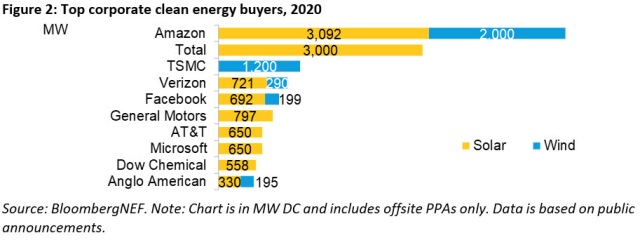Corporations purchased a record of 23.7GW of clean energy in 2020, up from 20.1GW in 2019 and 13.6GW in 2018, according to new research published by BloombergNEF (BNEF).
BNEF finds in its 1H 2021 Corporate Energy Market Outlook that clean energy contracts were signed by more than 130 companies in sectors ranging from oil & gas to big tech.
The U.S. was the largest market, but was less dominant than in previous years. Companies announced 11.9GW of corporate PPAs in the U.S. in 2020, down from 14.1GW in 2019 – the first year-on-year drop since 2016. Companies announced just 4.3GW of corporate PPAs in the U.S. in the first half.
Latin America had a down year, with PPA volumes dropping from 2GW in 2019 to 1.5GW in 2020. The region was hit hard by the Covid-19 pandemic and the economic downturn. Companies in Brazil signed a record 1,047MW of corporate PPAs in 2020.
Corporate PPA volumes in the Europe, Middle East and Africa (EMEA) region nearly tripled, from 2.6GW in 2019 to a record 7.2GW in 2020.
 In Spain, companies announced contracts to purchase no less than 4.2GW of clean energy, up from 300MW the previous year. Solar and wind projects in Spain yield some of the cheapest and most competitive prices in Europe, thanks to strong natural resources and a large pool of experienced developers.
In Spain, companies announced contracts to purchase no less than 4.2GW of clean energy, up from 300MW the previous year. Solar and wind projects in Spain yield some of the cheapest and most competitive prices in Europe, thanks to strong natural resources and a large pool of experienced developers.
Companies like Total and Anheuser Busch are orchestrating ‘cross-border virtual PPAs’ in Spain, buying clean energy in the country to offset their load elsewhere in Europe.
Corporations also purchased record clean energy volumes in the Asia Pacific (APAC) region, announcing contracts for 2.9GW of solar and wind.
Taiwan established itself as a major corporate clean energy market in 2020, with companies signing PPAs totalling 1.25GW. Taiwan’s market should be supported by a new policy that requires companies with an annual load above 5MW to buy clean power.
South Korea is expected to be the next major corporate procurement market in Asia. Policymakers revised the country’s Electric Utility Act in the beginning of 2021, creating a PPA mechanism and a green tariff program with Korea Electric Power Corporation. The revision will also allow companies to purchase unbundled certificates and retire them against sustainability commitments. South Korean companies face similar supply chain pressures to those in Taiwan.
Jonas Rooze, lead sustainability analyst at BNEF, said: “More than ever before, corporations have access to affordable clean energy at a global scale. Companies no longer have an excuse for falling behind on setting and working towards a clean energy target.”
Amazon was the leading buyer of clean energy in 2020, announcing 35 separate clean energy PPAs in 2020, totalling 5.1GW. The company has now purchased over 7.5GW of clean energy to date, vaulting it ahead of Google (6.6GW) and Facebook (5.9GW) as the world’s largest clean energy buyer. French oil major Total (3GW), TSMC (1.2GW) and U.S. telecom Verizon (1GW) were the next largest corporate buyers of clean energy in 2020.

